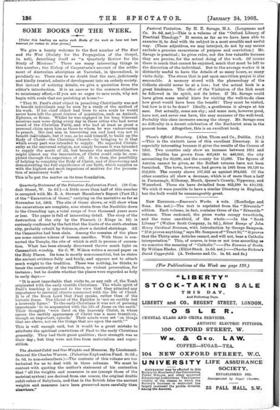Quarterly Statement 'of the Palestine Exploration Fund. (38 Con- duit
Street, W. 2s. 6d.)—A little more than half of this number is occupied with Mr. R. A. Stewart Macalister's Report (Part H.) of the "Excavation of Gezer," carrying on the narrative as far as November 1st, 1902. The site of Gezer shows, or will show when the excavations are complete, nine strata from the Neolithic down to the Crusading age, a total range of four thousand years more or less. The paper is full of interesting detail. The story of the destruction of the city by the Pharaoh (1 Kings ix. 16) is curiously confirmed by the fact that the limits of the sixth-stratum city, probably rebuilt by Solomon, show a decided shrinkage. All the Canaanites had been slain. Among the remains of the place are some sinister tokens of human sacrifice. With these is con- nected the Temple, the site of which is still in process of excava- tion. • What has been already 'discovered throws much light on Canaanitish worship. Sir C. W. Wilson writes a second paper on the Holy Places. Its tone is mostly non-committal, but he states the ancient evidence fully and fairly, and appears not to attach much weight to the tradition. There was nothing, he thinks, to break the continuity of the tradition, no violent persecution, for instance ; but he doubts whether the places were regarded as holy in early days :-- " It is most improbable that visits to, or any cult of, the Tomb originated with the early Gentile Christians. The whole spirit of Paul's teaching is opposed to the view that they attached any importance to material objects connected with the life of Christ. It is of the Risen Lord that Paul speaks, rather than of the historic Jesus. The Christ of the Epistles is `not an earthly but a heavenly figure.' To the early Christians it was not of pressing importance ' to be acquainted with the life of Jesus on the earth.' Their thoughts were fixed on the heavenly Christ, in whose career the earthly appearance of Christ was a mere transitory, though an important, episode.' Their minds were set ' on things that are above, not on the things that are upon the earth.."' This is well enough said, but it would be a great mistake to attribute the spiritual convictions of Paul to the early Christians generally. They had their great qualities ; their strength was as their day ; but they were not free from materialism and super-






































 Previous page
Previous page